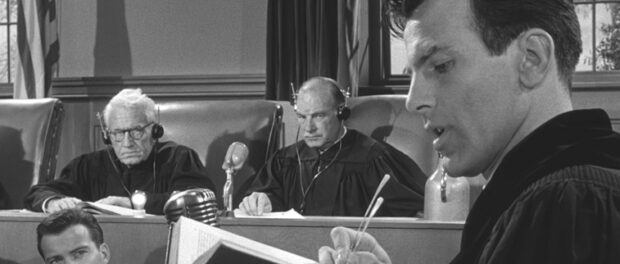Judgment at Nuremberg (1961)
[8]
Stanley Kramer (Inherit the Wind, Guess Who’s Coming to Dinner) directs an impressive roster of talent in this dramatization of four Nazi judges on trial for war crimes in occupied Germany. Spencer Tracy leads the cast as the American judge summoned to preside over the case. While considering passionate arguments from the prosecution (Richard Widmark) and defense (Maximilian Schell), he spends his evenings developing a deeper understanding of the German people with Marlene Dietrich, who plays the once wealthy widow of an executed Nazi officer. Through investigations both formal and informal, Tracy tries to uncover the truth behind the Holocaust — how did an entire country of people allow such atrocities to be committed?
Prior to seeing it, Judgment at Nuremberg was one of those films that intimidated me. It is, after all, a three-hour long courtroom trial movie — not one of my favorite subgenres. But this is no dry procedural. It’s a riveting mystery full of complex, fascinating characters. Widmark may be the prosecutor, but he’s also a military colonel all too aware of how much America needs Germany to be its ally in the coming Cold War. Schell defends his clients with considerable rationalism, insisting they had no choice but to follow orders. At the same time, he quietly disdains American interference in Germany’s affairs. Dietrich humanizes the Germans for Tracy (the two might even be falling in love), but in her haste to forget and move on, she fails to give the past its due deference. Burt Lancaster plays one of the judges on trial, a once revered pillar of his community who is now deeply remorseful for his sins. Yet by following orders, he caused many Jews to be forcibly sterilized or sent to concentration camps. Not a single character is depicted as wholly good or wholly evil. Judy Garland and Montgomery Clift appear as very emotional, highly damning witnesses to the defense, but even they have cracks in their facades.
The struggle between good and evil plays out not just on the battlefield, but inside the soul of every character in Judgment at Nuremberg. Each of the actors rises to the occasion, empowered by Abby Mann’s provocative writing. Kramer makes the courtroom scenes unexpectedly cinematic with creative angles and camera movement. He also opens the film up with plenty of scenes outside the courtroom — including Tracy’s haunting visit to one of Hitler’s abandoned rally sites.
While Judgment at Nuremberg deals with specific characters, crimes and judgments, it’s more than just a chronicle of history. It asks a big question: How can good people do such horrible things? It shatters any notion of denial and begs us to find an explanation. Because such things did happen, and they can happen again.
With William Shatner.
Academy Awards: Best Actor (Maximilian Schell), Adapted Screenplay (Abby Mann)
Oscar Nominations: Best Picture, Director, Actor (Spencer Tracy), Supporting Actress (Judy Garland), Supporting Actor (Montgomery Clift), Cinematography, Art Direction, Costume Design, Film Editing


